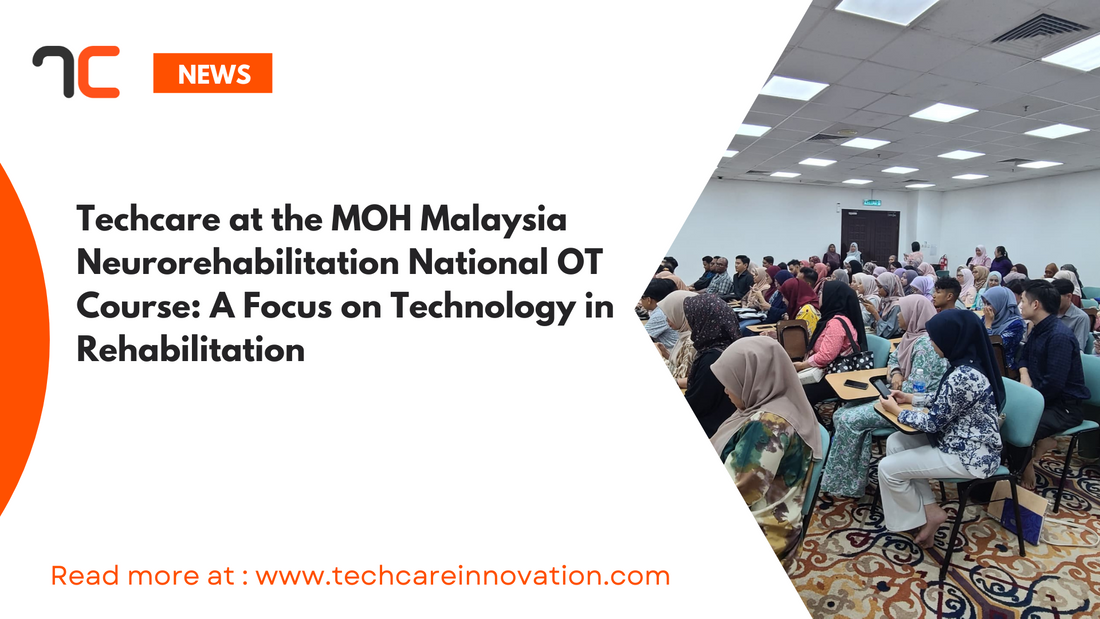Kuala Lumpur, Malaysia (AUGUST, 2024) – The Ministry of Health (MOH) Malaysia organized Neurorehabilitation National OT Course, a premier event in Malaysia, brought together occupational therapists. This course served as a platform for professionals in the field of physiotherapy rehabilitation to discuss the latest advancements, share knowledge, and explore innovative approaches to patient care. The event's focus on neurorehabilitation highlighted the importance of specialized care in improving the quality of life for patients with neurological conditions.

The importance of neurorehabilitation cannot be overstated. As neurological conditions often lead to severe disabilities, timely and effective intervention is crucial. Neurorehabilitation not only helps patients regain lost functions but also plays a vital role in preventing further complications, such as muscle atrophy and cognitive decline. The field continues to evolve with the integration of advanced technologies, making it possible to provide more personalized and effective care.
Techcare Share Key Insight on Technologies in Rehabilitation Advancements
At this event, Dr.Khor is the co-founder of Techcare Innovation with PhD in Rehabilitaiton Engineering with over 10 years experiences in the field. He presented and shared insights on the role of technology in rehabilitation. His presentation emphasized how technological advancements are transforming the way rehabilitation is approached, offering new tools and methods that significantly enhance patient care. Dr. Khor’s session was a highlight of the conference, showcasing the potential of technology to revolutionize rehabilitation practices.

Dr. Khor discussed the importance of technology in rehabilitation, drawing on content from the Techcare Innovation portfolio. He explained that technology enhances precision and consistency in therapeutic interventions, making treatment more personalized and engaging. By integrating tools such as motion analysis systems, robotic devices, and cognitive rehabilitation platforms, therapists can provide more accurate assessments and tailor treatment plans to meet individual patient needs. These advancements not only improve patient outcomes but also make rehabilitation more accessible and efficient.
Dr. Khor further addressed the current needs and challenges in rehabilitation, including limited access to advanced resources, high costs of treatment, and the need for more scalable and time-efficient solutions. He emphasized that while these challenges are significant, they also present opportunities for innovation. By leveraging technology, healthcare providers can overcome these barriers, offering more comprehensive and effective rehabilitation services to a broader patient population.

Thus, Dr. Khor explained how technology can overcome these challenges in rehabilitation. He detailed how technology are making it possible to provide real-time feedback, personalized treatment plans, and continuous monitoring. These technological advancements are helping to reduce the manual burden on therapists, improve patient engagement, and ensure that rehabilitation is more accessible, efficient, and effective.
Evidence-Based Applications of Technology Revolutionizing Rehabilitation Practices
During his presentation, Dr. Khor also outlined the various types of rehabilitation technology currently available. He highlighted the use of robotic rehabilitation devices, such as hand robot, which supports upper limb rehabilitation, and digital balance board, designed for balance training. Additionally, he discussed the benefits of virtual reality systems and tele-rehabilitation platforms in enhancing patient engagement and extending the reach of care beyond traditional clinical settings.
Dr. Khor also provided practical examples of how these technologies are being applied in clinical settings, supported by evidence-based research. He discussed the integration of devices such as the hand robotic training device, which assists patients in regaining hand function after a stroke, and the Interactive Light Systems, which enhance reaction time and cognitive processing. These examples demonstrated the tangible benefits of incorporating technology into rehabilitation practices.
In addition to discussing the broader applications of rehabilitation technology, Dr. Khor highlighted specific Techcare Innovation devices that are designed to address the challenges faced in modern rehabilitation. He showcased the FIBOD Digital Balance Board, Hand Robot 2.0, and other Techcare tools that help improve the quality, efficiency, and accessibility of care. These devices are essential for therapists looking to provide more personalized and effective treatment, ultimately leading to better patient outcomes.
A Grateful Experience: Building Knowledge and Connections
Techcare Innovation is grateful for the opportunity to participate in the Neurorehabilitation National OT Course and share insights on the transformative role of technology in rehabilitation. The event not only allowed us to showcase our products but also provided valuable opportunities to connect with occupational therapists and industry experts across the nation.

Innovate Your Services with Technology that Cares
If you are interested in learning more about how Techcare products can benefit your practice or wish to explore other advanced physical therapy solutions, please do not hesitate to contact us. Reach out to our team via WhatsApp for more information and to schedule a demonstration.
For more information, visit our website or follow us on social media for the latest updates and success stories from Techcare.
WhatsApp: https://wa.me/601158803469
Email: info@techcareinnovation.com
Website: http://www.techcareinnovation.com
#Techcare #Rehab #OccupationalTherapy #OT #Neurorehabilitation #RehabilitationTechnology #HealthcareInnovation

